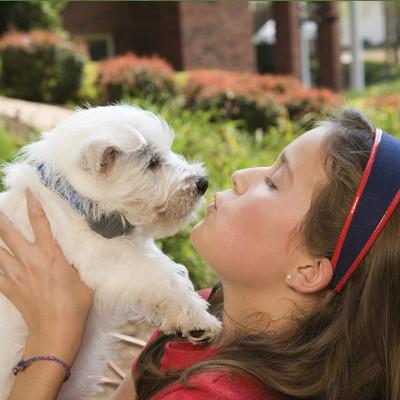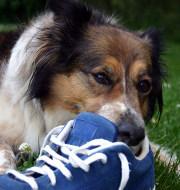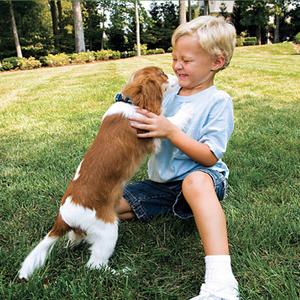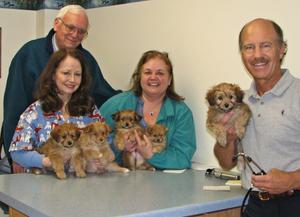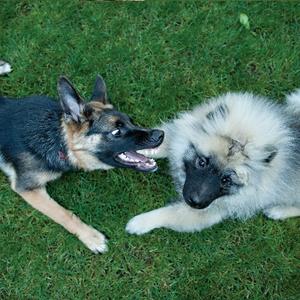 By Roslyn Ayers, PetSafe Web Content Specialist
By Roslyn Ayers, PetSafe Web Content Specialist
As a volunteer, foster parent, board member, and former employee for Agape Animal Rescue of Nashville, Tennessee, Kirsten Floyd has had plenty of experience with saving animals. Like most animal rescue organizations, Agape has dealt with their share of puppy mill busts. That’s why I asked her to enlighten me about what a puppy mill is and how to avoid them.
What Is a Puppy Mill?
A puppy mill is a place where dogs are bred for profit and live in horrible conditions. The goal is to produce and sell as many puppies as possible without any thought to the welfare of the animals. The dogs are often in horribly dirty wire cages, walking on a floor of their own feces, and have nails that are so long they curl under. The dogs usually have medical issues because they haven’t been taken care of. Many puppies will die of the parvo virus, or they might die of a flea and tick infestation.
The mother dogs are forced to breed constantly, and because the owners don’t usually bring in new animals, the puppies can be horribly inbred. The owners of these places may even call themselves “reputable breeders,” when in reality they’re more like animal hoarders . 
George and Mary, pictured here, were recently rescued from a puppy mill by Agape. After some time in foster care, they eventually found their forever homes.
Where Do You Find Puppy Mills?
Some of these places have websites and might look totally reputable, but a lot of the time they’re really not. You might think you’ve found a good breeder, and when you show up you see a cute mom and her puppies. But a mile down the road are all the other animals, crammed into a barn or warehouse.
They’ll show you some healthy dogs to convince you that all of their animals are like that. Location-wise, we’ve seen quite a few puppy mills in more rural areas.
Where Do Puppy Mills Sell Their Dogs?
Some are on sites like Craigslist. Many are in pet stores. With these pet store puppies, they might seem fine when you bring them home, and then die a week later, or it might be a few months or years before you find out from a routine vet check that the seemingly healthy dog you bought has several congenital health problems.
If you are thinking of buying a dog from a pet store, find out where they get their animals. Most pet stores get their puppies from breeders, which are often puppy mill dogs. And there are also some pet stores that don’t actually sell animals, and they will instead only offer adoptable dogs from local shelters. It pays to do your research before buying.
How Can You Tell the Difference between a Reputable Breeder and a Puppy Mill Breeder?
If you buy a dog from a breeder, there’s always the risk that they are not all that reputable. Adopting is the only way to ensure you’re not actually supporting puppy mills. However, if you do choose to buy rather than adopt, never buy from a breeder who:
- Only features pictures of their dogs indoors. If the pictures on their website or at their facility only show dogs inside, or against blank backgrounds, that could mean their dogs don’t ever get to go outside.
- Sells puppies younger than 8 weeks old. This is not good for the puppies and is just a way for them to get rid of puppies sooner.
- Refuses to show you their whole facility. If you’re visiting a breeder’s facilities, ask to be shown around the whole property. Pay special attention to anything like a shed or barn. Ask to see other dogs and moms too. Show up un-announced to visit their facility if you think they might not show you everything.
- Show a general lack of transparency or unwillingness to answer questions.
- Won’t give you references from other customers.
- Doesn’t give you medical records for the animals. Don’t buy from anyone who says they administered shots themselves or anyone who refuses to give you vet records.
- Won’t show you their certification. This is not a 100% guarantee, but it’s a bad sign if they refuse to show it to you.
- Has dogs with health issues like dry skin, matted hair, curled fingernails, bad smell, etc.
- Has dogs with behavioral problems like pacing, whimpering, running away, etc.
What Should You Do If You Find a Puppy Mill?
It depends on the rules for the county where the puppy mill is located. Start by asking that county’s animal control. Give them the details and address and they’ll check it out. If animal control is less than responsive, you can report it online. Best Friends Animal Society has some great resources.
 Here are George and Mary after they were rescued from a puppy mill. They enjoyed resting in a comfy bed in their foster home.
Here are George and Mary after they were rescued from a puppy mill. They enjoyed resting in a comfy bed in their foster home.
What Happens After Animal Control Busts a Puppy Mill?
Many puppy mills operate for years before it comes to this. Animal control or other law enforcement agencies have reports and forms, and they have to follow certain procedures. They must give the puppy mill owner warnings and come back and check to see if the owner has taken steps to correct the problem. This can go on for years, sometimes because it’s not a priority for them. Or it may be because they simply don’t have the capacity to deal with the problem; they would have to euthanize all of the animals at the puppy mill. In those cases, animal control might call in a group like the Animal Rescue Corps, a group of volunteers that travels across the country to help.
When a puppy mill raid is about to happen, animal control will send the request for help and give a date for when the raid will happen. When they get to the puppy mill, they start by taking photos and videos of the situation, to make sure they will have the legal backing in court to make sure the owners won’t get the animals back. Next, veterinarians will assess the animals and do emergency care. Then they bring in the trusted volunteer groups to take the animals to shelters and foster care, where they’ll get the long-term care they need.
What Happens to the Puppy Mill Dogs after the Raid?
Of the puppy mills we’ve encountered in the Nashville area, there’s usually around 100 dogs at each puppy mill. Lots of the dogs are breeding and pregnant moms. Each group usually takes about 15 dogs each, depending on how many foster families are available. Each group continues to do their own assessments for the next few weeks.
Some of the dogs may need to be euthanized for medical reasons. How each dog recovers depends on how long they’ve been there and the facility conditions. Puppies will usually only have medical issues, though all of the dogs will probably suffer some medical problems for the rest of their lives.
Behavior-wise, many will have trouble walking normally at first, or getting potty trained. These dogs may havenever walked on a floor before, or seen a door, or been around other dogs. Generally the longer they were at the puppy mill, the more issues they tend to have. One of the biggest behavioral problems is the lack of human touch and connection. Many of these dogs act like they’re feral. They are often nervous around people and can’t trust or even get near people. We had one really severe case of a rescued puppy mill dog. This dog stayed in a corner for 3 years. Now he has learned to sit in his owner’s lap, but he will run away if she touches him. Some of these dogs can be rehabilitated, and some will just need to be accommodated and adopted by a patient, experienced person who is willing to deal with their issues.
How Can We Prevent This Animal Cruelty?
DON’T:
- “Rescue” animals from puppy mills. Some people claim they are “saving” animals from a puppy mill. Buying from a bad breeder is still contributing to their business, and money is the reason they exist
- Buy an animal from someone you don’t trust. Follow the guidelines above about how to avoid puppy mills.
- Get a dog you’re not ready for. Rescued dogs are great, but especially with puppy mill rescues, you should make sure you can handle all of the medical and behavioral problems they might have before adopting.
DO:
- Adopt a dog from a shelter or rescue organization on the off-chance that your breeder is not as good as they seem.
- Go to your local pet store and ask them where their animals come from. Encourage them to feature shelter pets.
- Tell your friends about this issue. If we stop supporting puppy mills, they can’t exist. Mutts are just as good, if not better, than purebreds!

